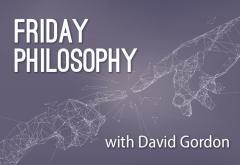Some economists are good at political philosophy as well. Mises and Rothbard of course come to mind, but the good philosophers aren’t confined to Austrian school economists. Amartya Sen and Kenneth Arrow know what they are talking about when it comes to philosophy, agree with them or not. But some eminent economists don’t, and, judging by Nicholas Wapshott’s new book, Samuelson Friedman (Norton, 2021), the most famous American economist of the twentieth century, Paul Samuelson, was not a philosophical giant. The book is a study of the Newsweek columns of Samuelson and Milton Friedman, and Samuelson doesn’t appear to have thought through philosophical issues very deeply. Friedman does much better, but I’m going to be talking only about Samuelson.
One of the clichés of anti–free market thought is the claim that human rights are more important than property rights. This is nonsense; property rights are rights of human beings to property. Samuelson accepts an extreme version of this cliché:
“The rights of property shrink as the rights of man expand,” he wrote. While some suffered because the government intervened in the market, an unfettered market had winners and losers, too, he argued. While the free market suggested that everyone was free to buy what they wanted, there was such a thing as rationing by price, which put many items well beyond the reach of those without the means. The children of those who could not afford good education, for instance, were deprived by the market setting too high a price. The “freedom” of individuals provided by the market was therefore only notional. (p. 80)
Samuelson has confused two different things. Suppose I would like to visit Paris but can’t afford an airplane ticket. I’m unable to do what I want, but no one is using force against me, or threatening to use force, to prevent me from going to Paris. I can’t go because I am unable to meet the price that the owner of the airplane has set for the use of its services. The situation would be quite different if I bought a ticket and government agents forcibly removed me from the plane. Samuelson could counter in this way: the distinction between being unable to do something because doing it requires the consent of someone else, which he declines to give, and to be forcibly prevented from doing something isn’t important. Nevertheless, there is a distinction, and Samuelson for the most part ignores it.
Indeed he soon makes even clearer that he doesn’t understand the distinction. “Samuelson saw prices merely as a means of rationing scarce goods…. Indeed, the deliberate raising and lowering of prices was often a means of guiding human behavior rather than following it. Throwing Friedman’s words back at him, Samuelson wrote, ‘libertarians fail to realize that the price system is, and ought to be, a method of coercion’” (p. 80).
There are, though, some indications that he acknowledges the distinction, but just doesn’t see why coercion, as libertarians understand it, is bad. “And even…
